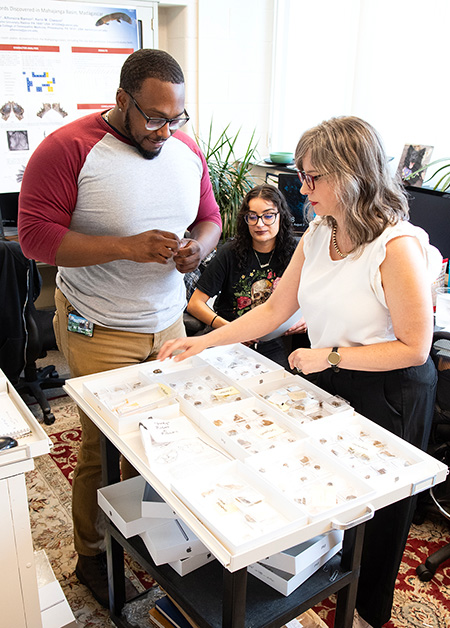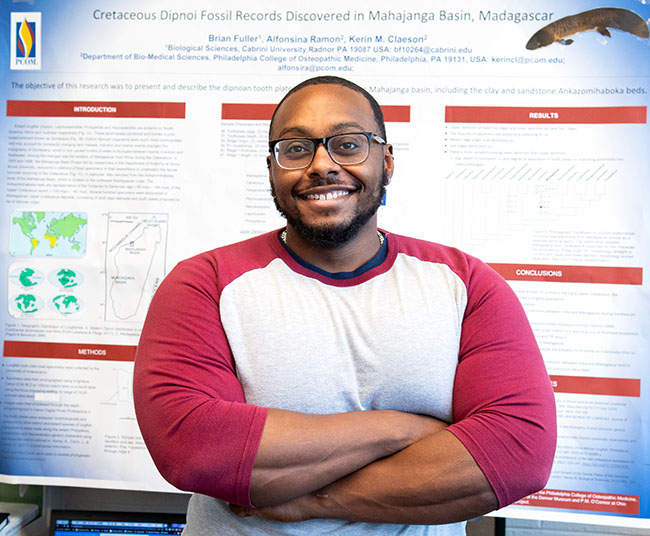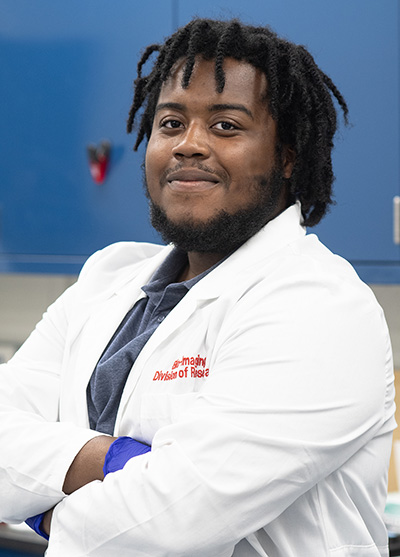Cabrini Partnership Offers Research Experience for Undergrads
September 6, 2023Brian Fuller's interest in scientific research began through sports, as an athlete
throughout childhood and as avid gym goer to this day at age 36. Playing baseball,
football, and basketball helped him understand what muscles needed to be strong and
for what reasons, as well as what's happening inside the body before, during and after
it is put to use. A passion for bodybuilding and its intricacies took his interest
in biology and physiology to new heights, due in part to the discipline's focus on
joint articulations.
Combine that with parents who worked in the pharmaceutical industry, and Fuller jokes
that he could say words like gastroenterology in kindergarten or explain drug launches
to friends when he was still young enough to fall out of his bed at night.
Now a nontraditional student majoring in biology at Cabrini University, Fuller is
part of a partnership between Philadelphia College of Osteopathic Medicine (PCOM) and Cabrini that offers research opportunities for historically underrepresented students majoring in science and psychology.
Cabrini students work with PCOM faculty, staff and students as part of medical research
teams. Over eight weeks, students learn how to formulate research questions and hypotheses,
design experiments, record results, interpret data and present their findings as part
of an oral presentation at PCOM.
This was Fuller's third summer in the program, and his commitment to research has
blossomed so much that he can often be seen in the lab of Kerin Claeson, PhD, a professor of anatomy who specializes in evolutionary biology, on days where he's
not required to be there so that he can advance projects.
“I can't get enough of it,” Fuller said. “I'm hooked on using my brain instead of
my body to feel fulfilled.”
Lab skills he's acquired and honed include imaging software for—and processing enormous
data sets of CT scans about—fossils estimated to be from the Cretaceous. His particular
focus is examining lungfish fossils, which are estimated to be about 70 million years
old, from Madagascar.
“Every time I step in here, I'm challenged. I'm not spoon-fed information,” said Fuller,
adding that the program showed him that his passion lies in ecology and sedimentology.
“Sometimes it gets exhausting, but I come back because I'm supported, because I'm
encouraged, I'm made to feel that I belong, and because of the skills I'm picking
up.”
Claeson said that she and her research assistant, Alfonsina Ramón, credit Fuller with
bringing new enthusiasm to the lab, calling Fridays (Fuller's main day at PCOM) her
“favorite day of the week over this last year, because the three of us were sitting
in the lab, collaborating, talking.” In October, Fuller is presenting their lungfish
fossil project at the Society of Vertebrate Paleontology.
“I knew I was getting an undergraduate, but the experiences he had before and being
very interested in what he was learning actually had him behave like a graduate student
from the get go,” Claeson said. “And in comparison to other students I've worked with,
he's at the very top.”
Moving Science Forward
Steven Morency, 21, a senior majoring in biology at Cabrini, knew that Fuller and
another classmate had both gone through the program, though he hadn't heard of PCOM
before his nomination for it.
“They do a lot of cool stuff here,” he said, emphasizing his interest in forensic
medicine (PCOM offers a master's degree in the discipline). “The skills I'm learning here now can help me in the future.”
During his time in the lab, he's been examining lens and cornea tissue and labeling
and staining specimens using immunofluorescence. He's also engaged in using a microtome
to cut paraffin-embedded tissue and placing it on a hot plate overnight to dry. From
there, the specimens are labeled and stained.
“I view science as constantly growing and changing, which also sums up my life. The
more realms of science I get exposed to, the more my curiosity to learn about them
flourishes,” Morency said. “Ever since I was young, I have dreamed and aspired to
become a scientist because I was always curious and always wanted to figure out why
things happen.”
PCOM gained two employees over the history of the program, one part-time and one full-time,
as well as former students who come back to the college to volunteer, said Jacquelyn
Gerhart, MS, director of the bioimaging facility and coordinator of research support
staff at PCOM and a mentor in the program, which is organized by the Division of Research, Admissions and the Office of Diversity and Community Relations.
Gerhart is also a two-time Cabrini alumna who credits her employment at PCOM—which
has spanned three decades—from a connection she made during an internship with a part-time
PCOM faculty member. Former program participants “are always welcome back,” she said.
“The students are amazing and move projects along,” said Gerhart, adding that new
perspectives—like those the mentees bring—contribute to advancing research. “Young
people and diverse ideas move science forward.”
About Philadelphia College of Osteopathic Medicine
Established in 1899, Philadelphia College of Osteopathic Medicine (PCOM) has trained
thousands of highly competent, caring physicians, health practitioners and behavioral
scientists who practice a “whole person” approach to care—treating people, not just
symptoms. PCOM, a private, not-for-profit accredited institution of higher education,
operates three campuses (PCOM, PCOM Georgia and PCOM South Georgia) and offers doctoral degrees in clinical psychology, educational psychology, osteopathic
medicine, pharmacy, physical therapy, and school psychology. The college also offers
graduate degrees in applied behavior analysis, applied positive psychology, biomedical
sciences, forensic medicine, medical laboratory science, mental health counseling,
physician assistant studies, and school psychology. PCOM students learn the importance
of health promotion, research, education and service to the community. Through its
community-based Healthcare Centers, PCOM provides care to medically underserved populations.
For more information, visit pcom.edu or call 215-871-6100.
Contact Us
For general media inquiries, please contact the Office of Marketing and Communications
at 215-871-6300 or communications@pcom.edu. Visit our media relations page to view contact information for public relations personnel.
Connect with PCOM

 Brian Fuller's interest in scientific research began through sports, as an athlete
throughout childhood and as avid gym goer to this day at age 36. Playing baseball,
football, and basketball helped him understand what muscles needed to be strong and
for what reasons, as well as what's happening inside the body before, during and after
it is put to use. A passion for bodybuilding and its intricacies took his interest
in biology and physiology to new heights, due in part to the discipline's focus on
joint articulations.
Brian Fuller's interest in scientific research began through sports, as an athlete
throughout childhood and as avid gym goer to this day at age 36. Playing baseball,
football, and basketball helped him understand what muscles needed to be strong and
for what reasons, as well as what's happening inside the body before, during and after
it is put to use. A passion for bodybuilding and its intricacies took his interest
in biology and physiology to new heights, due in part to the discipline's focus on
joint articulations. “I can't get enough of it,” Fuller said. “I'm hooked on using my brain instead of
my body to feel fulfilled.”
“I can't get enough of it,” Fuller said. “I'm hooked on using my brain instead of
my body to feel fulfilled.” “They do a lot of cool stuff here,” he said, emphasizing his interest in forensic
medicine (PCOM offers a
“They do a lot of cool stuff here,” he said, emphasizing his interest in forensic
medicine (PCOM offers a 